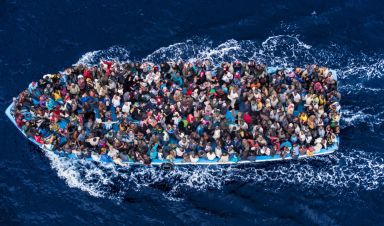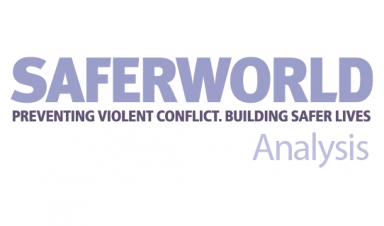The dangers of the EU's quick fix approach to migration
9 November 2015At the Valletta Summit, which took place on 11-12 November, European and African states agreed on a joint Action Plan to respond to the large numbers of migrants and refugees travelling from Africa to Europe. As implementation gets underway, Kloe Tricot O’Farrell urges the European Union and its Member States to demonstrate their commitment to peace by prioritising long-term development and peacebuilding engagement to tackle the root causes of migration and forced displacement.
In the past few months, the EU and its Member States have come under increasing pressure to respond to the unprecedented numbers of migrants and refugees reaching and travelling to Europe. In addition to adopting strategies to inform the EU’s external action, such as the Action Plan for the Horn of Africa, they also agreed at the Valletta Summit to enhance cooperation on migration with their African partners in five priority areas: addressing the root causes of migration; advancing legal migration and mobility possibilities; reinforcing the protection of migrants and asylum seekers; tackling the exploitation and trafficking of migrants; and facilitating return, readmission and reintegration.
In this framework, the particular attention paid to addressing the root causes of internal displacement, irregular migration and refugee flows, notably by addressing and preventing conflict and instability, and by supporting statebuilding, rule of law and good governance, is welcome. However, in practice the EU approach appears to prioritise ‘quick wins’ to stem the flow of migrants and refugees travelling to Europe over longer-term efforts to address the root causes of migration in countries of origin. This is notably apparent in the identification by the joint Action Plan of the Khartoum Process as one of the main mechanisms for cooperation on migration with states from the Horn of Africa.
Launched in November 2014, the Khartoum Process is a forum for political dialogue and cooperation on migration between EU Member States, States from the Horn of Africa – namely Djibouti, Egypt, Eritrea, Ethiopia, Kenya, Somalia, South Sudan, Sudan and Tunisia – as well as the EU and the African Union. However, although the Declaration of the Ministerial Conference which launched the Khartoum Process notes the importance of addressing the root causes of migration, the majority of actions it outlines concerns operational measures designed to increase the capacity of migration officials and systems, notably to manage borders and tackle human trafficking and smuggling. Moreover, the Declaration narrowly promotes ‘sustainable development’ as the long-term solution to addressing the root causes of migration, and as such risks over-simplifying and depoliticising the causes of migration. However, without addressing the root causes of migration, and more specifically the root causes of the conflicts and instability driving migratory flows, the EU’s engagement is unlikely to yield positive or sustainable results.
In addition, the EU’s overall approach prioritises building the capacity of states that are responsible for creating or failing to deal with the conditions that can lead to migration and displacement. For instance, according to UNHCR, in 2014 Sudan was the fourth largest country of origin for refugees, with an estimate of 666,000, and had 3.1 million internally displaced people on its territory. By enhancing engagement on migration with the Sudanese regime, the EU is in effect overlooking the role that political instability, human rights violations, poor governance, corruption and economic collapse in Sudan are playing in pushing people to leave – issues that have contributed to the imposition of a range of EU sanctions on Sudan including an arms embargo, travel restrictions and freezing of funds and economic resources.
By providing capacity building support to state authorities, it also risks denying protection to the people having to leave or flee their homes. For instance, a Human Rights Watch report found that Sudanese traffickers had kidnapped, abused and tortured refugees to extort money from them or their families, but also that Sudanese police and military officials had colluded with traffickers by handing victims over to them, turning a blind eye at checkpoints, and returning escaped trafficking victims to traffickers. The report further notes that Sudanese authorities failed to identify and prosecute traffickers and the security officials who have colluded with them.
Reinforcing partnerships with repressive regimes that are responsible for significant refugee outflows and should be held accountable also risks legitimising their role internationally at a time when more scrutiny on their domestic policies is needed. Notably, while the EU has generally been cautious when engaging with Sudan – which, as noted, is under EU sanctions – increased engagement on migration risks conferring legitimacy on the government and plays into the hands of its foreign relations strategy, which presents the country as an “island of stability in a chaotic region”. As Saferworld’s Ahmed Kodouda points out, the Sudanese regime is currently feeling emboldened and is selling its allegiance to the highest bidder, irrespective of what would benefit the country most. The EU’s recognition risks reinforcing the regime and increasing its resilience to international pressure to address the root causes of migration and forced displacement.
In conclusion, while the EU and its Member States recognise that there is a need for a comprehensive approach to address migratory flows, in implementing the joint Action Plan they need to demonstrate their commitment to tackling migration at source and to balancing ‘quick wins’ with long-term development and peacebuilding engagement. They must also ensure transparency around the implementation of the joint Action Plan, including the Khartoum Process, to build confidence and ensure that affected populations and civil society organisations can verify that EU and Member States’ commitments to peace and human security are at the centre of their efforts and that the process is not reinforcing regimes that are in large part responsible for the problem.
Kloe Tricot O'Farrell is Saferworld's EU Advocacy Officer.
“In order to achieve quick wins to disrupt migratory flows from the Horn of Africa to Europe, there is a clear risk that conflict prevention and peacebuilding objectives will be deprioritised”
Kloe Tricot O'Farrell


